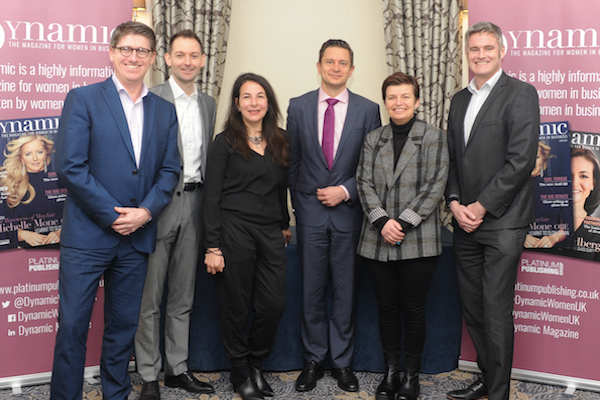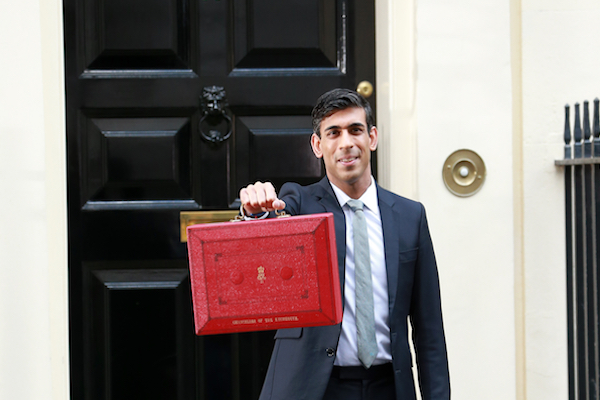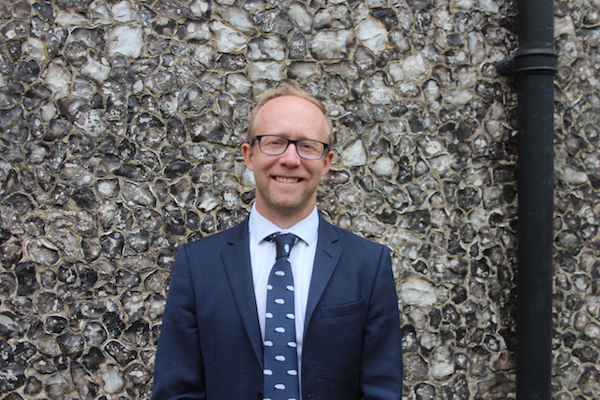
This year, The Platinum Group is hosting a series of forums with some of the leading business people in the region, discussing the issues affecting commerce, industry, technology and a range of other fascinating topics. For the second in the series, we gathered six of the most influential business people in the recruitment sector to discuss ‘Recruitment in the 21st Century’. Platinum CEO Maarten Hoffmann took the role of chair and facilitator, and the panel comprised of the following...
ALAN HARBER
Lloyds Bank Commercial Banking
Alan Harber, Lloyds Bank Commercial Banking Group’s Area Director leads a team of experienced Relationship Managers, with a focus on supporting businesses within the £3m to £25m turnover bracket throughout Sussex and the surrounding area. The team has a wealth of knowledge in helping clients via a face-to-face offering, ensuring they reach shared business objectives via innovative banking product support.
AMANDA MENAHEM
Consultant
An award-winning seasoned business and HR professional, Amanda has worked in a number of different industries ranging from pharmaceuticals, insurance, retail and hospitality. Amanda is a fellow of the Chartered Institute of Personnel and Development, and has various qualifications in Executive Coaching (ILM), psychometrics building including the Myers Briggs Type Indicator (MBTI), Insights, and NLP at Master level.
CHAY TOOK
Kreston Reeves
Chay is a staff Partner at award-winning Chartered Accountants and Financial Advisers Kreston Reeves. Based in the company’s Worthing office, he looks after owner-managed businesses of all sizes and manages the firm’s payroll team. Chay is also President of the Worthing & Adur Chamber of Commerce, one of the largest and most prestigious business groups in the region.
LEON DEAKIN
Coffin Mew
Leon is head of the employment team at Coffin Mew and specialises in contentious and non-contentious matters. He leads the firm’s technology sector helping start-up, scale-up businesses and large companies who are creating, or adapting to, new and emerging technology. He is particularly interested in how businesses become workplaces of the future to ensure they recruit and retain the best talent.
NICI JUPP
Talent Gateway
Nici Jupp is Founder and Managing Director of Talent Gateway, established in 2012. Talent Gateway specialises in recruiting marketing talent for dynamic B2B and B2C businesses in the south east. They are adept at recruiting single roles through to full teams, and understand the intricacies of the world of marketing, to help connect organisations with the best cutting-edge, strategic marketers.
JOE BROWN
Peopleforce Technical Recruitment
Joe Brown is the Co-Founder and Director of Peopleforce Technical Recruitment – an award-winning consultancy providing skilled candidates to a number of technical industries. The business has grown significantly since its formation in 2013 with a staff of 12 people and an annual turnover in excess of £15m. Joe has particular expertise within the Medical and Pharmaceutical Sectors.
How has technology changed recruitment?
Nici: Technology has fundamentally changed the landscape, but it always comes down to what the client needs, so my personal view is you don’t use technology for technology’s sake, you use it if appropriate. AI has been successful for us to help assess personality types which allows us
to communicate in a way that the potential candidate would prefer to receive that information.
Joe: From an employer’s perspective, a big advance has been Applicant Tracking Systems. Any big employer will have all the applicant’s data in a database which they can store or apply algorithms to match the applicant to suitable roles. The company can start to build a pool of talent. Candidates do benefit from sites or apps such as Glassdoor which collate information about companies. In the past, companies might have been able to control the image of themselves, now you can read the real opinions of those working at the company.
Chay: We use a lot of the same tools that the recruiters use, but for certain jobs at more senior levels you can’t beat a decent human consultant who can match people and get the best outcomes.
Amanda: There’s a temptation to use technology to replace the human element, but recruiting is all about people at the end of the day. Technology is really efficient for the administrative side and speeding up the process of recruitment. It is especially useful in the marketing of positions and promoting the company to potential candidates.
What will the future of work look like?
Amanda: I wonder whether in the future we will see an increase in the gig economy. Are we going to be recruiting for traditional jobs or for piece work that needs doing?
Nici: My sense is you’ll end up with a blend. Some people have an appetite for working flexibly but others value certainty.
Joe: Smaller companies will be more able to tap into talent pools for a certain period or a specific project. We will see a growth of the gig economy within sectors it has so far not affected. As an employer, moving totally towards a flexible working pattern is very difficult, not knowing who’s doing what job, not knowing who’s going to be dealing with a client day to day.
Leon: One of the continual struggles is that law is always behind technology. An example is the gig economy where the law has been so far behind. We’ve seen this with Uber and Pimlico Plumbers - trying to fit the market into law that was written when people went to work for employers nine-to-five. The government hasn’t properly legislated for the issues that have arisen from the gig economy. They need to look at how we assess who is an employee or who is self-employed.
Alan: We have to keep adapting as we will see jobs come in that didn’t exist two or three years ago. At Lloyds, we up-skill our current colleagues and give them the tools and the opportunities. There has been an awful lot of internal investment in helping bring colleagues into the new way of working. You need really great people to develop and bring on new talent. Whilst recruiting from external market is great, there is a cost to bringing new people in, and it is often best to invest in the people you have.
Should applicants be judged by their social media posts?
Nici: We don’t check social media as a recruiter, but we know many clients will investigate people who are going to work for them. If you’re posting on social media, be prepared that it may be used against you. I’m pleased that my teenage children are taught at school that once you post something, it is out there for all to see whether you like it or not.
Leon: I would highly caution against employers checking through social media, unless you
are recruiting for a high profile role where the newspapers are going to be trawling back through people’s social media. The problem, legally, is we don’t ask people about their sexual orientation, if are they disabled, if are they married or do they have children. The second you trawl through someone’s social media account, you now potentially have
this knowledge. And if the person finds out you’ve checked them out, they could ask why they didn’t get the job. You have rights as
an individual to access what information a business has about you by which you can obtain with a Subject Access Request. Do you want to run that risk? Probably not for information that may be of limited value.
Joe: There’s no reason to assume an applicant’s social media activity would impact on their ability to do the job, but it’s a fine line to tread if it is a high profile position.
Chay: I think its okay if you use social media to find what makes them tick, but not to try and catch someone out. Ultimately you are looking for people who can deal with people and build relationships. In life you have to start off by trusting people and presuming they’re not bad, rather than seeing the worst in people. The other challenge with LinkedIn is that our people are getting bombarded by 10 or 15 job offers every week. It only takes someone to have a bad day and then see a job offer ping up on their LinkedIn... I worry that short term snap decisions can really map out people’s lives.
Amanda: If you want to find out what a person is truly like, there are better ways. At Hastings Direct, we would hire business psychologists to go through executive assessments. They do a whole person analysis. You can’t hide from that sort of thing in a recruitment process.
Nici: There’s a technique called whole person interviewing, which line managers can be trained how to do, that really does glean a lot of information about the actual person, which is what we’re trying to find when we trawl their Facebook pages.
Can AI really replace recruiters?
Amanda: AI does guard against a human tendency to want to recruit in your own image; it can be very subconscious but leads to indirect discrimination. By being very rigorous and using very skilfully designed psychometric AI processes, you can guard against that inherent subconscious bias.
Nici: There are some great tools that help with the recruitment process. People write in a certain way and it’s surprising how many words are favoured by one gender, and not another. By using some of these tools you can ensure that you are openly recruiting to attract the widest in the pool.
Leon: There was an experiment in
the US which used AI to pronounce judgements for criminal convictions, but as it was based on data fed into it from previous cases, it discriminated against ethnic minorities. They got harsher sentences because it reflected trends in the data that had been put in. There have been plenty of examples of AI programmes being embedded with the prejudices of the programmers. But humans have also made arbitrary decisions in the past. If you had thousands of CVs, you had to apply some arbitrary way of getting down to the best ones.
Alan: The key is good leadership. If you sit people around the board table who are exactly the same as you, you can’t expect different outcomes. We need a mix of all types of people from all types of backgrounds in order to give us balance in our decision making and also to give us a little bit of healthy tension. Clients often say LinkedIn is really useful to see more potential candidates, but there is still the danger of unconscious bias. AI is another tool for your kit bag when you’re making a decision on recruiting. Recruitment is one of the biggest challenges. We are constantly searching for the next person. Some of this can be built-in algorithms, but an awful lot is built on seeing what the applicant can do and their aptitude to learn.
Nici: Recruitment is based on trust. Employers trust the fact that we understand the right technology to use, but technology will only take you so far. It’s your job as a recruiter to go one step further to uncover the people that technology might not pick up. The answer is technology, combined with human interaction.
Joe: People often look for the quick fix but it’s very hard to roll out any change without cracks emerging. A line manager will often go back to the way it was done in the past. It’s very hard for an employer to put in place a new process that will be totally seamless and that will never have any kind of weaknesses in it.
Amanda: Leaders should see attracting and managing talent as being an absolutely crucial and ongoing part of their role. When a senior leader goes to a conference or industry event, they should have their talent-spotting head on. Leaders see it as somebody else’s job to recruit people but they need to be focusing on this all the time, always be recruiting.
Do employees now demand flexible working?
Nici: We don’t necessarily get people demanding flexible working but we will always have the conversation about flexible working. A company’s attitude towards flexible working paints a picture about them as a potential employer. It suggests whether or not they are forward- thinking.
Alan: I don’t think you can afford not to embrace flexible working. Doing the right thing retains great talent and attracts talent. Keep investing in people and you will get the right outcomes. We’re client-facing which makes it more complicated, but things have changed. Clients often want to see you at 7am or 7pm. This means we can choose to start and finish early, or start and finish late. We are aware that attracting different people means you need to create different environments, including flexible working. Lloyds have a successful back-to-work programme to help those people who feel they can’t return to work because maybe the job doesn’t now fit. We encourage finding ways for the job to work because we know they’re great people and we value what they do.
Joe: Employers lose out on people
if they don’t offer a bit of flexibility.
But flexibility must be both ways. If employees aren’t flexible as well, it can really put pressure on others within the team who have to pick up the slack when they finish early. If you work from home, you have to be contactable or it can really put a lot of pressure on others within the business.
Leon: Employers are now starting from a position of “How can we make this work?” rather than “How can we justify saying no?”. It is driven by the desire to attract and keep the best people. The aim is to treat people like responsible, grown up adults, and not expect them to feel they need to justify flexible hours. You often hear people explain in detail what they had done when working at home. We know! We trust you!
Chay: Another argument you hear for working at home is the carbon footprint: “Why am I travelling 20 miles each way to work? I don’t need to be in the office. I can work from home all day.” The green issue is often a reason for people to change their working patterns.
Amanda: The millennial generation in particular value the work/life balance; it is more important to them than it was with Generation X.
Joe: Fewer and fewer people seem to be learning to drive and many don’t have the desire to sit in traffic for an hour each morning. They would much rather be able to work closer to home or more flexibly.
Alan: There are more opportunities to work remotely now. We meet via Webex which is basically a video call, and it took a bit of time to get used to it. The new generation of people coming through have been FaceTiming each other since they were very young, so a video call is normal for them.
Are employees equipped for the changing workplace?
Chay: I would recommend a series
of short films called Shift Happens which talks about how the world is changing. We know that people who start university are already out of date by the time they finish their three-year course. We’ve just got to be open to change.
Joe: When the coal mines closed in the 1980s, it caused devastation to many communities because the work wasn’t there and the miners didn’t get any training in new skills. As a country we mustn’t allow that kind of thing to happen again. Where there are big manufacturing bases, we’ve got to start thinking about what can replace those
at an early stage and getting people interested in pursuing other things, so that we haven’t got a cliff edge where a car factory closes and there’s another 1,500 people out of work.
Nici: It’s not necessarily about teaching a skill. It’s about a mindset. We now have access to constant learning and it doesn’t have to cost a lot of money, which is key for some people. It’s about remaining curious, inquisitive and wanting to learn. Individuals must want to constantly learn and develop. Employers must be open minded when recruiting. We have to take responsibility for ourselves to embrace what is out there, and move forward.
Joe: I’ve seen examples where people successfully move into a new sector and bring different ways of thinking into a role. It might be, for example, within a sales position where someone’s actually come from a technical background. As a recruiter, it’s my job to make sure that the employer sees the benefit in that candidate.
Is our education system producing candidates ready for work?
Amanda: I am going to be controversial and say it’s getting worse in universities. A few years ago we were talking about life skills, and I think that’s a big issue today. University educators should be focusing on teaching students life skills including taking individual responsibility, being self-reliant, being resourceful, creating their own opportunities and getting what they want. What I’m seeing now, having employed millennials quite recently, is that we’ve almost gone backwards. People come out of education institutions feeling that they should be handed things on a plate.
Chay: In employing a young person from school or college, l look for someone who shows
some passion for work, such as a Saturday
job or Duke of Edinburgh Award. Anything that indicates their willingness to put themselves forward and learn. We can’t do those one-week work experiences that we used to do for the kids at school. In the past we used to give someone a bag of receipts to add up. It’s all done by software now.
Nici: One of the things that is lacking in the education system is a mindset to take a risk and possibly fail. Risk is something that you need to embrace. I still don’t see it being encouraged in school. There is nothing to stop children leaving school and setting up a business, but they have got to be comfortable taking risk.
Amanda: Society doesn’t encourage it either. Employers often talk about wanting entrepreneurial spirit within an organisation and yet they have appraisal systems and performance management systems which punish failure. So, it doesn’t work.
Alan: Employers hope that the universities and colleges are going to create people ready to hit the ground running, with a core set of skills. You can come out with any kind of degree and move into a business but once you arrive, that business needs to have a really great internal development programme to get the very best out of you. I’ve been lucky as I have been able to continue my learning from day one. I did a sustainability course last month which was supported by Cambridge University. I never thought I’d be doing a qualification for sustainability if I go back 10 years. In another 10 years’ time, I’ll probably have to learn something new. My niece and nephew have hit 17 and are going out in the world. They’re just learning new skills the whole time, and I think it’s really exciting as long as you’ve got a forward-thinking company supporting you.
Are recruiters spending more time these days actively searching for candidates rather than waiting for them to come to them?
Nici: I can't remember the exact stat but it's something like two-thirds
of the people that get jobs aren't proactively looking, which means that you've got to go and seek them out. My job is to get someone to feel alive when they go to work. We certainly chase the candidate.
Chay: Recently I was interviewing for our student intake and they are very interested in our corporate social responsibility and the charity page on our website. I also interviewed for a very senior director role and the page that was most interest to that person was about our culture and values.
Joe: People are much more perceptive about who they want to work for these days, and companies have to attract people. It's a lot harder than just putting out an advert. As a recruiter, maybe 80- 90% of the conversations that we have with people are with those who aren't actively looking for work, and they don't know that there's a good opportunity out there for them.
LISTEN IN FULL
You can heat all of the conversation by streaming the exclusive podcast at http://www.buzzsprout.com/887299





